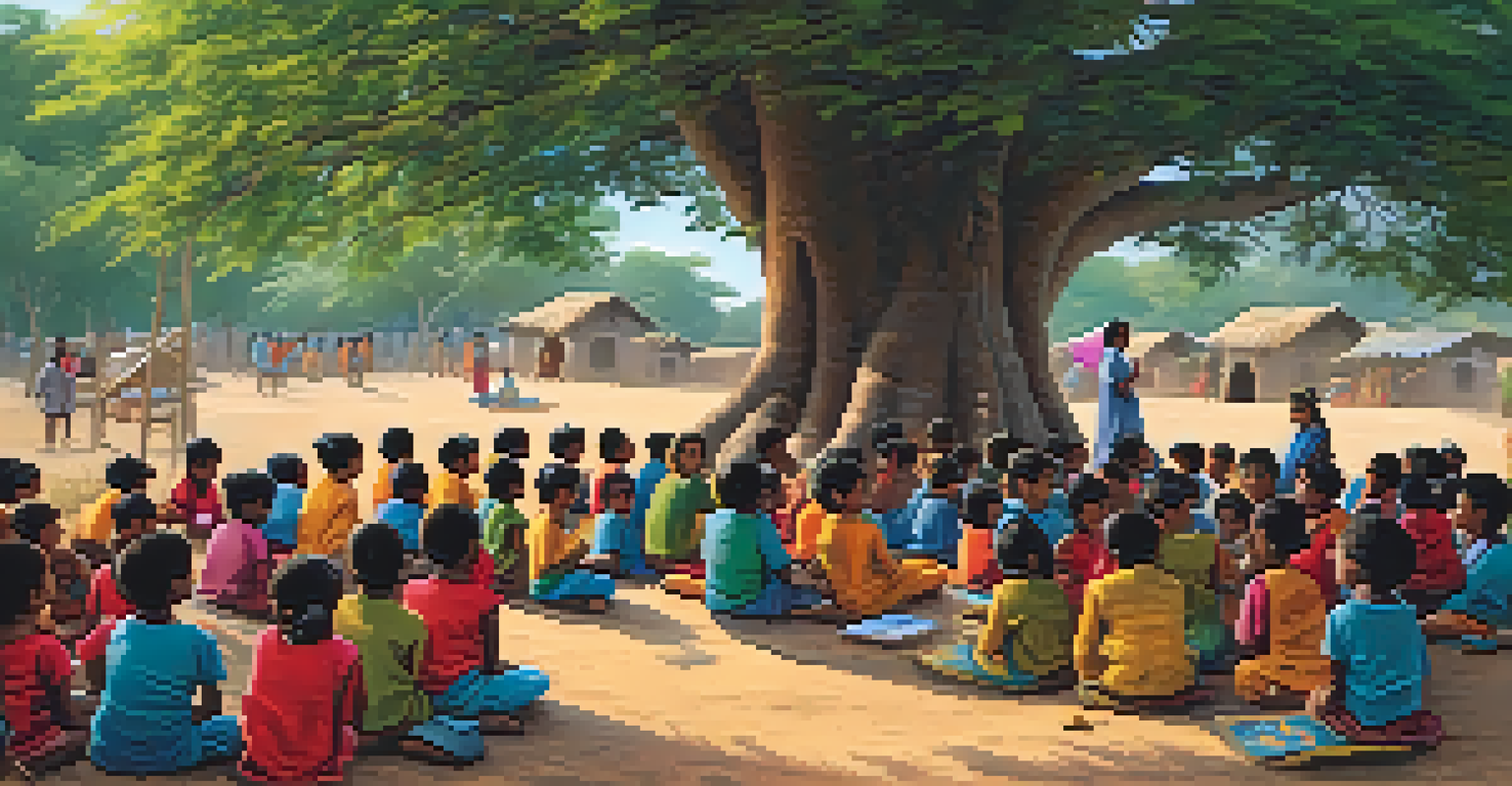The Role of Volunteer Tourism in Sustainable Development in India

Understanding Volunteer Tourism and Its Significance
Volunteer tourism, often referred to as 'voluntourism,' combines travel with volunteer work, allowing individuals to contribute positively to communities while exploring new cultures. In India, this concept has gained traction as travelers seek meaningful experiences beyond traditional tourism. It's not just about seeing the sights; it's about making a difference.
The best way to find yourself is to lose yourself in the service of others.
This form of tourism is significant because it encourages participants to engage with local communities, fostering cultural exchange and mutual understanding. Volunteers often work on projects that address pressing social issues, such as education, health care, or environmental conservation. Through their efforts, they help communities thrive while also enriching their own travel experiences.
Moreover, volunteer tourism can lead to sustainable development by promoting responsible travel practices. When volunteers contribute their time and skills, they generate economic benefits for local communities and help build infrastructure that supports long-term growth.
The Economic Benefits of Volunteer Tourism
One of the most immediate impacts of volunteer tourism is its contribution to the local economy. Many volunteer programs partner with local organizations, which ensures that funds are reinvested into the community. This influx of resources can help create jobs, support local businesses, and stimulate economic growth.

For instance, volunteers often stay in community-run accommodations, eat at local restaurants, and purchase handmade crafts, which directly benefits the residents. This economic boost can be crucial in rural areas where traditional employment opportunities may be limited. Additionally, the presence of volunteers can attract further investment and tourism to these regions.
Positive Impact on Local Economies
Volunteer tourism significantly boosts local economies by creating jobs, supporting businesses, and reinvesting funds into communities.
Beyond mere financial support, volunteer tourism encourages skill sharing and capacity building, enabling communities to improve their own economic conditions. Volunteers bring diverse skills and perspectives, empowering locals with knowledge and resources that can lead to sustainable economic practices.
Promoting Social Change Through Volunteer Initiatives
Volunteer tourism plays a vital role in driving social change by addressing critical issues such as education, gender equality, and healthcare. Many organizations focus on projects that aim to uplift marginalized communities, providing volunteers with the opportunity to make significant contributions. For example, teaching English or supporting women's empowerment initiatives can lead to transformative changes in local societies.
Volunteering is at the very core of being a human. No one has made it through life without someone else's help.
These volunteer-led projects often create lasting impacts, as they help build awareness and foster a sense of solidarity among community members. When volunteers collaborate with locals, they not only share knowledge but also help inspire hope and resilience. This shared experience can strengthen community bonds and encourage collaborative problem-solving.
Moreover, the presence of volunteers can amplify the voices of local communities, bringing attention to their struggles and successes. By sharing their stories and experiences through social media or blogs, volunteers can act as advocates, attracting further support and resources for essential initiatives.
Environmental Sustainability and Conservation Efforts
In India, environmental challenges such as deforestation, pollution, and climate change are pressing issues. Volunteer tourism can play a critical role in conservation efforts by mobilizing individuals to participate in environmental projects. Whether it’s beach clean-ups, tree planting, or wildlife conservation, volunteers contribute hands-on support to protect the planet.
These initiatives not only help to restore ecosystems but also raise awareness about environmental issues among both volunteers and local communities. When volunteers engage in conservation efforts, they learn about the importance of biodiversity and sustainable practices, which they can then share with others upon returning home.
Driving Social Change and Advocacy
Through targeted initiatives, volunteer tourism addresses critical social issues, fostering awareness and empowering marginalized communities.
Additionally, many volunteer programs incorporate educational components, teaching participants about local environmental challenges and sustainability. This approach fosters a deeper understanding of the interconnectedness of global and local environmental issues, encouraging volunteers to advocate for sustainable development long after they leave.
Cultural Exchange and Mutual Understanding
One of the most enriching aspects of volunteer tourism is the opportunity for cultural exchange. Volunteers immerse themselves in local traditions, customs, and lifestyles, which helps break down cultural barriers and fosters mutual respect. This experience can lead to transformative personal growth, as participants gain new perspectives and insights.
Engaging with local communities allows volunteers to learn about the challenges and successes faced by residents. This firsthand experience cultivates empathy and understanding, which can challenge stereotypes and promote a more nuanced view of the world.
Moreover, the connections formed between volunteers and locals often lead to lasting friendships, creating a network of global citizens committed to making a difference. These relationships can inspire ongoing collaboration and support for sustainable development efforts long after the volunteer experience ends.
Challenges Faced by Volunteer Tourism Initiatives
Despite the many benefits, volunteer tourism is not without its challenges. Critics argue that some volunteer programs can perpetuate a 'white savior' complex, where volunteers inadvertently impose their values and solutions on local communities without fully understanding their needs. This can lead to projects that are not sustainable or beneficial in the long run.
Additionally, the influx of volunteers can sometimes strain local resources, particularly in areas that are not equipped to handle large numbers of visitors. Communities may struggle to accommodate volunteers, leading to issues such as overcrowding or resource depletion. It’s crucial for organizations to strike a balance between volunteer involvement and community capacity.
Cultural Exchange Enhances Understanding
Engaging with local communities allows volunteers to experience cultural exchange, breaking down barriers and fostering mutual respect.
To address these challenges, it’s essential for volunteer programs to prioritize ethical practices, ensuring that projects are developed in collaboration with local communities. This approach helps to ensure that initiatives are relevant, respectful, and sustainable, ultimately benefiting both volunteers and the communities they serve.
The Future of Volunteer Tourism in India
As the world becomes more interconnected, the future of volunteer tourism in India looks promising. With a growing awareness of social and environmental issues, more travelers are seeking meaningful experiences that contribute to sustainable development. This trend presents a unique opportunity for India to harness the power of volunteer tourism for positive change.
However, the key to success lies in creating responsible, ethical programs that prioritize community needs and sustainability. Collaboration between local organizations, governments, and volunteers is crucial to ensure that initiatives are impactful and beneficial for all parties involved.

Looking ahead, the integration of technology and social media can further enhance volunteer tourism by fostering connections and showcasing the positive impacts of volunteer efforts. As more individuals share their experiences, the movement will continue to grow, ultimately contributing to a more sustainable and just world.